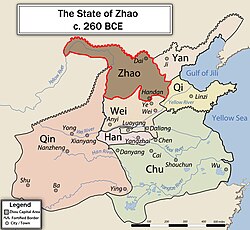
Back Çjao (çarlıq) Azerbaijani چژاو (چارلیق) AZB Estat de Zhao Catalan ویلایەتی ژاوۆ CKB Zhao (Staat) German Estado Zhao Spanish Zhao French Zhao (negara) ID Zhao (stato) Italian 趙 (戦国) Japanese
State of Zhao 趙 | |||||||||
|---|---|---|---|---|---|---|---|---|---|
| 403 BC–222 BC | |||||||||
 | |||||||||
| Status | State → Kingdom | ||||||||
| Capital | Jinyang, Handan | ||||||||
| Religion | |||||||||
| Government | Monarchy | ||||||||
• 423 BCE - 409 BCE (first) | Marquess Xian of Zhao | ||||||||
• 403 BCE - 400 BCE | Marquess Lie of Zhao | ||||||||
• 386 BCE - 375 BCE | Marquess Jing of Zhao | ||||||||
• 374 BCE - 350 BCE | Marquess Cheng of Zhao | ||||||||
• 349 BCE - 326 BCE | Marquess Su of Zhao | ||||||||
• 325 BCE - 299 BCE | King Wuling of Zhao | ||||||||
• 298 BCE - 266 BCE | King Huiwen of Zhao | ||||||||
• 265 BCE - 245 BCE | King Xiaocheng of Zhao | ||||||||
• 244 BCE - 236 BCE | King Daoxiang of Zhao | ||||||||
• 235 BCE - 228 BCE | King Youmiu of Zhao | ||||||||
• 227 BCE - 223 BCE (last) | King Jia of Zhao | ||||||||
| Historical era | Warring States period | ||||||||
| 403 BC | |||||||||
• Conquered by Qin | 222 BC | ||||||||
| Currency | |||||||||
| |||||||||
| Zhao | |||||||||||||||||||||||||||||
|---|---|---|---|---|---|---|---|---|---|---|---|---|---|---|---|---|---|---|---|---|---|---|---|---|---|---|---|---|---|
 "Zhao" in seal script (top), Traditional (middle), and Simplified (bottom) Chinese characters | |||||||||||||||||||||||||||||
| Traditional Chinese | 趙 | ||||||||||||||||||||||||||||
| Simplified Chinese | 赵 | ||||||||||||||||||||||||||||
| |||||||||||||||||||||||||||||

Zhao (traditional Chinese: 趙; simplified Chinese: 赵) was one of the seven major states during the Warring States period of ancient China. It emerged from the tripartite division of Jin, along with Han and Wei, in the 5th century BC. Zhao gained considerable strength from the military reforms initiated during the reign of King Wuling, but suffered a crushing defeat at the hands of Qin at the Battle of Changping. Its territory included areas in the modern provinces of Inner Mongolia, Hebei, Shanxi and Shaanxi. It bordered the states of Qin, Wei, and Yan, as well as various nomadic peoples including the Hu and Xiongnu. Its capital was Handan, in modern Hebei province.
Zhao was home to the administrative philosopher Shen Dao, Confucian Xun Kuang, and Gonsun Long, who is affiliated to the school of names.[1]
- ^ Huang Kejian (2016) [2010]. From Destiny to Dao: A Survey of Pre-Qin Philosophy in China. Silkroad Press. p. 185. ISBN 978-1-62320-070-1.